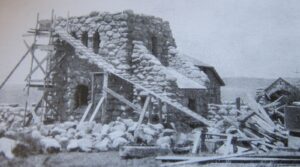I awoke from a striking dream this morning before dawn. I’m not sure how it began. It seemed to be another one of those dreams in which I’m wandering through a strange but familiar city. Perhaps I had lost someone. I don’t recall.
Anyway, I was walking down an empty street along what appeared to be a fenced park when I encountered a gate. Looking through the gate, I saw a building—a large, neoclassical building. It looked to be made of red—or pink—granite. As I approached the building, I saw its large double doors. They were a darker red—cherry wood, perhaps. I ascended the steps and found that one of the doors was slightly ajar, so I opened it and stepped inside.
It was a library, and a rather dark one at that. Opposite the entrance, just before me about twenty feet away, there was a broad desk with a dim lamp, inhabited by an elderly woman. She looked up, and hardly seeming to notice me, stood and walked out from behind the desk, whereupon she turned back toward me and cocked her head as if to say, “this way.” So I followed her.
The librarian led me back to the stacks, where the light was even more dim than it had been at the entrance. Her wiry frame held up a black, knee-length dress. It vanished here and there as she passed through the shadows of the more densely packed shelves. The tapping of her heels echoed off the hardwood floor.
Somewhere I noticed a change: her hair was black in the dim light. “Hadn’t it been grey?” I asked myself. Then the curve of her hips: it was suddenly full and smooth. I dared to examine her calves. I stopped momentarily to verify what I had just seen. Seeming to notice my hesitation, she turned back toward me. It was true: she was younger, and she was beautiful. She wore the same dress, and the same spectacles, only now the dress seemed tailored for her body’s curves, and her glasses framed her eyes as though they were two twin gems in some crime movie. Something about her was unearthly, yet she was quite familiar.
The librarian stopped and turned, and she pulled a book off the shelf, handed it to me, and then she leaned against the shelving and waited. I looked through the book. All the pages were blank. I looked up to her and showed her two of the empty pages. She turned toward the stack and reached up, standing on her toes, and slowly pulled out another volume. I could barely make out the black silhouette of her dress in the darkness, stretching flush against the mass of volumes. She pulled the book down and I shyly turned away as she handed the book to me. I handed her back the book with the blank pages, and I soon discovered the book she had just handed me was the same: there was nothing in it.
So it went. She led me down the narrow canyon of shelves, handing me volume after volume of emptiness. Sometimes the pages were fresh, white, and even glossy. Sometimes they were yellowed with time.
The young librarian eventually led me to where the stacks ended at a wall. The shelves there were empty but for a single book. I could see this clearly in the light of a naked bulb that shone from high on the wall. I could also see that the librarian’s dress, though black, was not entirely opaque. I could see through it in the light as she handed me the lone book.
But I didn’t open the book because of what I saw all over her dress. It was some kind of writing. The script glowed dimly in the light. It was glowing from within the black fabric. I reached for her collar and turned it out. There was writing, sure enough, in Spanish, I thought, but then I noticed it wasn’t Spanish. There was another collar under the collar of the dress. It was white, and it too had writing, and I turned it over and then—I noticed there were more layers underneath.
I dampened my fingertips and peeled the layers back as the pages of her breast opened like a white rose. The pages turned silently. The words, being in that foreign tongue, were incomprehensible—yet familiar, maybe the words of a song or a poem. As I dug more and more deeply into her pages I could hear her breathing, more and more clearly with every page. My hands thrilled to the touch of each cool sheet, but my fingers began to tremble and stumble. The pages slipped out of their grasp, and I awoke.
My eyes stared up at the ceiling, and I listened to my wife’s rhythmic breathing.
